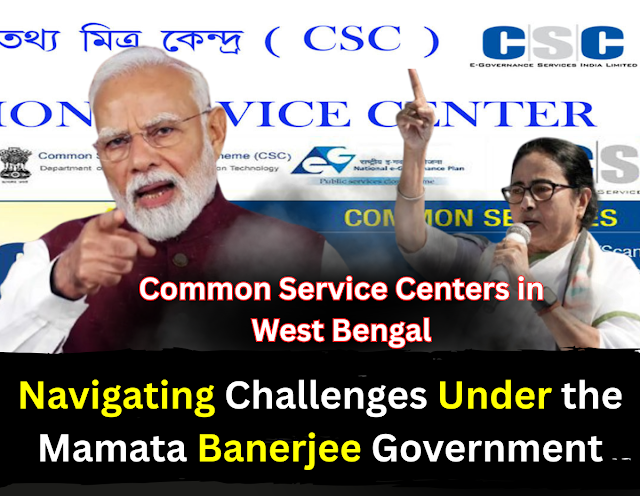Common Service Centers in West Bengal: Navigating Challenges Under the Mamata Banerjee Government
The Common Service Centers (CSCs) were envisioned as a cornerstone of India's digital inclusion efforts, bringing government and private services to the doorstep of rural citizens.
This report delves into the specific issues and the perceived impact on CSC operations and the delivery of central government services in the state.
The Rise of Bangla Sahayata Kendras (BSKs) and its Impact on CSCs
A primary point of contention and a major source of difficulty for CSCs in West Bengal has been the state government's decision to establish its own network of service centers, known as Bangla Sahayata Kendras (BSKs).
- Parallel Service Delivery: The West Bengal government, through a notification dated October 12, 2020, declared that all its public and para-statal services would henceforth be rendered through BSKs. This move directly created a parallel infrastructure to CSCs for state-level services.
- Discouraging CSC Usage: Chief Minister Mamata Banerjee has reportedly urged citizens to visit BSKs, which offer digital services free of cost, as opposed to CSCs, where users pay a nominal fee for services. This direct encouragement to utilize BSKs over CSCs has naturally led to a significant diversion of citizens from CSCs, impacting the revenue and viability of VLEs.
- Alleged Closures and Restrictions: Reports indicate that following the BSK notification, some CSCs were allegedly locked by local gram panchayat officials and their agents, preventing VLEs from operating. While the central government maintains that CSCs are a Union initiative and any hindrance to their functioning is unconstitutional (as stated in a Rajya Sabha Unstarred Question in November 2024), the on-ground implementation of these state-level directives has seemingly created a challenging environment for VLEs.
- Impact on VLE Livelihoods: The shift in service delivery and the alleged restrictions have directly impacted the livelihoods of thousands of VLEs in West Bengal. A significant number of CSCs have reportedly closed down, leading to a loss of earning opportunities for individuals who had invested their time and resources in establishing these centers. CSC e-Governance Services India Limited reported that as of October 2024, nearly 6,000 CSCs had closed in West Bengal between 2017 and October 2024 due to various reasons, including operational and administrative challenges. Given that each CSC on average generates employment for 3-4 persons, this closure has affected over 20,000 individuals.
Restrictions on Central Government Services: A Tug-of-War
Beyond the parallel BSK initiative, there have been concerns raised about the West Bengal government's approach to the delivery of central government services through CSCs.
- Perceived Hindrance to Central Schemes: While CSCs are designed to be the primary last-mile delivery points for a wide array of central government schemes (like PM Jan Dhan Yojana, Ayushman Bharat, PM Kisan, etc.), there have been claims that the state government's emphasis on BSKs and its overall political stance might indirectly create an environment that discourages citizens from accessing these central schemes through CSCs.
- Political Implications: The dynamic between the central and state governments, often characterized by political rivalry, has seeped into administrative functions. The perception among some VLEs is that the state government views the robust functioning of central government-backed initiatives like CSCs as a credit to the central government, which it may seek to diminish or control. This can lead to a less cooperative environment for CSCs.
- Lack of State-Specific Services Integration: While CSCs are intended to deliver both central and state government services, the focus on BSKs by the West Bengal government means that many state-specific services are not integrated or promoted through CSCs, limiting their comprehensive utility for citizens. This forces citizens to visit different centers for different types of services, defeating the "single-window" concept of CSCs.
Challenges Beyond State-Specific Policies
While the state government's policies are a significant factor, it's important to acknowledge that CSCs in West Bengal, like those in other parts of India, also face common operational challenges:
- Digital Literacy and Awareness: Despite efforts, a segment of the rural population still lacks sufficient digital literacy and awareness of the services available through CSCs, irrespective of the platform.
3 - Infrastructure Gaps: Issues like intermittent internet connectivity, power fluctuations, and limited access to necessary hardware can hinder smooth operations.
- VLE Viability: Ensuring the sustained economic viability of VLEs remains a challenge, as their income is primarily dependent on the volume and type of services they deliver. Competitive pricing and the availability of free services elsewhere can impact this.
- Training and Support: Continuous training and technical support for VLEs are crucial for them to stay updated with new services and technologies.
The "Paschim Banga CSC VLE Morcha" has been formed in a context where VLEs in West Bengal are grappling with a complex set of challenges. While the central government continues to support and promote CSCs as a vital arm of Digital India, the state government's parallel initiatives and alleged directives have undeniably created a difficult operating environment for VLEs in West Bengal.
The success of the CSC model hinges on the collaborative spirit between central and state governments. The current situation in West Bengal highlights the complexities of federal governance and the impact of political dynamics on grassroots initiatives designed for public good. For CSCs to truly flourish in the state and effectively serve the citizens, a more harmonious and cooperative approach from all levels of government would be beneficial, prioritizing citizen access to services above political considerations. The VLEs, as the frontline service providers, are caught in this crossfire and are seeking a more stable and supportive environment to continue their crucial work of digital empowerment.












0 Comments